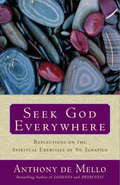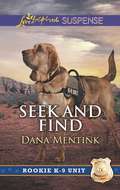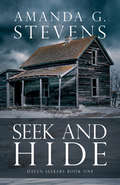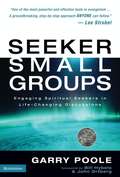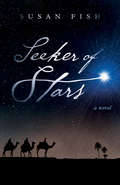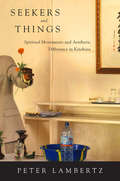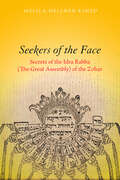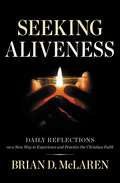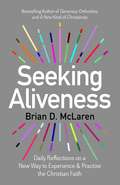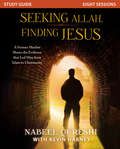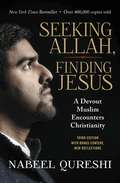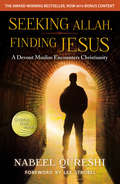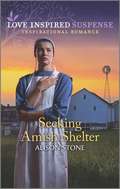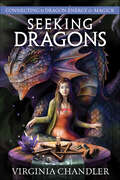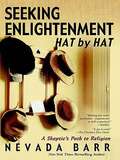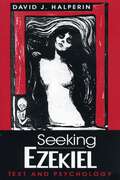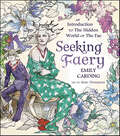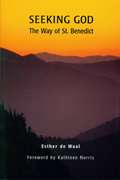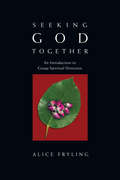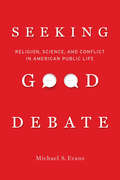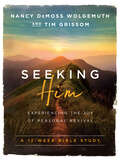- Table View
- List View
Seek God Everywhere: Reflections on the Spiritual Exercises of St. Ignatius
by Anthony De MelloIn this inspiring work, the author of "Awareness" provides his unique insight into the "Spiritual Exercises of St. Ignatius," one of the great masterpieces of Christian spirituality.
Seek Me with All Your Heart: Seek Me With All Your Heart, The Wonder Of Your Love, His Love Endures Forever (The Land of Canaan Novels #1)
by Beth WisemanWhat would cause the Amish to move to Colorado, leaving family and friends behind?Some Amish are making the trek to Colorado for cheaper land. Others are fleeing strict bishops with long memories.For Emily Detweiler and her family, the move is more personal. Tragedy struck Emily in Ohio, shaking loose everything she believed was firm, including her faith. Her family took the bold step of leaving Ohio to resettle in a small Amish community in Canaan, Colorado, where they hope the distance will help erase painful memories.David Stoltzfus's family moved to Colorado for reasons he doesn't understand. But Canaan is turning out to be something other than the promised land they all anticipated. Fearing that a health condition will cut his life short, David plans to return home to Paradise, Pennsylvania, as soon as he can. But then he meets Emily, who stirs feelings in his heart despite his apprehension about the future.Emily's growing love for David surprises her, but she fears that he will find out the truth about her past and reject her. But what if the truth is that they are made for each other? And that God longs to give them the desires of their hearts if only they will seek Him first?
Seek and Find
by Dana MentinkKILLER HEADLINE Reporter Madison Coles wants to write an exposé on the crime spree rocking Desert Valley, Arizona-but the small town's residents and police are tight-lipped. Even when Madison herself is attacked, the only help she can get is protection from rookie K-9 officer James Harrison and his trusty bloodhound. Suspicious of the reporter's motives, the handsome cop keeps her at arm's length. But the more Madison's life is threatened, the more focused she is on finding the truth-and the closer she gets to James. Can he help her find the story without them both ending up in the obituary pages? Rookie K-9 Unit: These lawmen solve the toughest cases with the help of their brave canine partners
Seek and Hide
by Amanda G. StevensSix years ago, the government took control of the church. Only re-translated Bibles are legal, and a specialized agency called the Constabulary enforces this and other regulations. Marcus Brenner, a new Christian, will do anything to protect his church family from imprisonment--including risk his own freedom to gain the trust of a government agent. Aubrey Weston recanted her faith when the Constabulary threatened her baby. Now released, she just wants to provide for her son and avoid government notice. But she's targeted again, and this time, her baby is taken into custody. If only she'd never denied Him, maybe God would hear her pleas for help. When Aubrey and Marcus's lives collide, they are forced to confront the lies they believe about themselves. And God is about to grab hold of Marcus's life in a way he'd never expect, turning a loner into a leader.
Seek the Truth: A 2-in-1 Collection
by Lynette EasonTwo disappearances, two mysteries, and two families harboring dangerous secrets in this single volume collection of romantic suspense novels.Her Stolen Past by Lynette EasonWhen Sonya Daniels finds a kidnapped baby’s birth certificate hidden in her late mother’s home, she’s shocked. What was her family’s connection to the child, still missing for over two decades? And what happened to the little girl? Sonya hires detective Brandon Hayes to investigate. But someone doesn’t want the truth to come out—and the answers could be more than Sonya can bear alone.Proof of Life by USA Today–bestselling author Laura ScottCSI investigator Shanna Dawson has never forgiven herself for the disappearance of her little sister, Skylar. For fourteen years there have been no leads. Until Skylar's fingerprints implicate her in a murder. Shanna is desperate to find Skylar. And so is campus cop Quinn Murphy, the victim's half brother. As their investigation uncovers family secrets, Shanna prays that the real killer is caught before Quinn is hurt or Skylar is lost forever.Plus a free bonus story—an excerpt from Laura Scott's Tracking Stolen SecretsPreviously published as Her Stolen Past and Proof of Life
Seeker Small Groups
by Garry PooleThis Silver Medallion Book Award and 2004 Christianity Today Book Award of Merit winner provides a detailed, step-by-step process for launching seeker small group strategy in a wide variety of settings.
Seeker of Stars
by Susan FishAs a boy, Melchior is fascinated by stars but has rigid obligations to apprentice with his rug-making father. When his life is radically changed, he is propelled onto a new path full of danger and glory in pursuit of a special star. The journey leads Melchior to reflect on life and death, dreams and duty, and to find unusual reconciliation within his family and with the God he never knew he sought. Destined to become a classic, Seeker of Stars offers a fresh retelling of the story of the magi, and will appeal to people of all ages and faiths.
Seekers and Things: Spiritual Movements and Aesthetic Difference in Kinshasa
by Peter LambertzFocusing on the intricate presence of a Japanese new religion (Sekai Kyûseikyô) in the densely populated and primarily Christian environment of Kinshasa (DR Congo), this ethnographic study offers a practitioner-orientated perspective to create a localized picture of religious globalization. Guided by an aesthetic approach to religion, the study moves beyond a focus limited to text and offers insights into the role of religious objects, spiritual technologies and aesthetic repertoires in the production and politics of difference. The boundaries between non-Christian religious minorities and the largely Christian public sphere involve fears and suspicion of "magic" and "occult sciences".
Seekers of the Face: Secrets of the Idra Rabba (The Great Assembly) of the Zohar (Studies in Jewish Mysticism)
by Melila Hellner-EshedA magisterial, modern reading of the deepest mysteries in the Kabbalistic tradition. Seekers of the Face opens the profound treasure house at the heart of Judaism's most important mystical work: the Idra Rabba (Great Gathering) of the Zohar. This is the story of the Great Assembly of mystics called to order by the master teacher and hero of the Zohar, Rabbi Shim'on bar Yochai, to align the divine faces and to heal Jewish religion. The Idra Rabba demands a radical expansion of the religious worldview, as it reveals God's faces and bodies in daring, anthropomorphic language. For the first time, Melila Hellner-Eshed makes this challenging, esoteric masterpiece meaningful for everyday readers. Hellner-Eshed expertly unpacks the Idra Rabba's rich grounding in tradition, its probing of hidden layers of consciousness and the psyche, and its striking, sacred images of the divine face. Leading readers of the Zohar on a transformative adventure in mystical experience, Seekers of the Face allows us to hear anew the Idra Rabba's bold call to heal and align the living faces of God.
Seeking Aliveness: Daily Reflections on a New Way to Experience and Practice the Christian Faith
by Brian D. Mclaren"The quest for aliveness is the heartbeat that pulses through the Bible . . . It's why we gather, celebrate, eat, abstain, attend, practice, sing, and contemplate."Based on his book We Make The Road By Walking, Brian D. McLaren presents a 52-week devotional to inspire and activate you in your spiritual journey. If you're a seeker exploring Christianity, if you're a long-term believer feeling downtrodden, if your faith seems to be a lot of talk without much practice, here you'll find a reorientation from a fresh and healthy perspective.Brian D. McLaren shows everything you need to explore what a difference an honest, living, growing faith can make in your life and in our world today. Through 52 weeks of thoughtful readings, SEEKING ALIVENESS gives an overview of the message of the whole Bible and guides you through a rich study of interactive learning and personal growth.
Seeking Aliveness: Daily Reflections on a New Way to Experience and Practise the Christian Faith
by Brian D. MclarenPraise for We Make the Road by Walking: 'innovative and refreshing' - Christianity magazineIn his 2014 book We Make the Road by Walking Brian McLaren gave a basic orientation on what it means to be 'a new kind of Christian' through 52 sermons, working within the framework of the church year and providing a Genesis-Revelation overview of the Bible. It was designed to be used in church services and small groups, and was praised by New Testament scholar Paula Gooder and enthusiastically adopted by many. Seeking Aliveness is a repurposing of this material for use by individuals, breaking up the text into daily devotions, along with the original suggested Bible readings and with a prayer, thought or action point for each day. Brian's original writing is transformed beautifully into a daily read, for admirers of the original book as well as a new audience. 'An ideal resource' - Church Times
Seeking Allah, Finding Jesus: A Devout Muslim Encounters Christianity
by Lee Strobel Nabeel QureshiAn Unexpected Journey from Islam to Christianity In Seeking Allah, Finding Jesus, Nabeel Qureshi describes his dramatic journey from Islam to Christianity, complete with friendships, investigations, and supernatural dreams along the way. Providing an intimate window into a loving Muslim home, Qureshi shares how he developed a passion for Islam before discovering, almost against his will, evidence that Jesus rose from the dead and claimed to be God. Unable to deny the arguments but not wanting to deny his family, Qureshi’s inner turmoil will challenge Christians and Muslims alike. Engaging and thought-provoking, Seeking Allah, Finding Jesus tells a powerful story of the clash between Islam and Christianity in one man’s heart—and of the peace he eventually found in Jesus. "I have seldom seen such genuine intellect combined with passion to match ... truly a 'must-read' book." –Ravi Zacharias
Seeking Allah, Finding Jesus: A Devout Muslim Encounters Christianity
by Lee Strobel Nabeel QureshiIn Seeking Allah, Finding Jesus, now expanded with new bonus content, Nabeel Qureshi describes his dramatic journey from Islam to Christianity, complete with friendships, investigations, and supernatural dreams along the way.Providing an intimate window into a loving Muslim home, Qureshi shares how he developed a passion for Islam before discovering, almost against his will, evidence that Jesus rose from the dead and claimed to be God. Unable to deny the arguments but not wanting to deny his family, Qureshi struggled with an inner turmoil that will challenge Christians, Muslims, and all those who are interested in the world’s greatest religions.Engaging and thought-provoking, Seeking Allah, Finding Jesus tells a powerful story of the clash between Islam and Christianity in one man’s heart--and of the peace he eventually found in Jesus.The New York Times bestselling Seeking Allah, Finding Jesus has been expanded to include:A revised foreword and introductionA new afterword by Mark Mittelberg and reflection by Nabeel's wifeA substantially extended epilogue that shares how Nabeel told his friend David of his decision to follow Christ, how his parents found out, and much moreExpert contributions from scholars and ministry leaders on each section of the book, contributions previously included only in the ebook editionAn appendix with a topical table of contents (for teaching from Seeking Allah, Finding Jesus)An appendix tackling the objection that Ahmadi Muslims are not true MuslimsAnd a sneak peek prologue from Nabeel’s book, No God but One: Allah or Jesus?
Seeking Allah, Finding Jesus: A Devout Muslim Encounters Christianity
by Lee Strobel Nabeel QureshiIn Seeking Allah, Finding Jesus, now expanded with bonus content, Nabeel Qureshi describes his dramatic journey from Islam to Christianity, complete with friendships, investigations, and supernatural dreams along the way.Providing an intimate window into a loving Muslim home, Qureshi shares how he developed a passion for Islam before discovering, almost against his will, evidence that Jesus rose from the dead and claimed to be God. Unable to deny the arguments but not wanting to deny his family, Qureshi struggled with an inner turmoil that will challenge Christians, Muslims, and all those who are interested in the world’s greatest religions.Engaging and thought-provoking, Seeking Allah, Finding Jesus tells a powerful story of the clash between Islam and Christianity in one man’s heart?and of the peace he eventually found in Jesus."I have seldom seen such genuine intellect combined with passion to match ... truly a 'must-read' book."—Ravi Zacharias
Seeking Amish Shelter
by Alison StoneThere’s nowhere safe…but the Amish life she left behind.Stumbling upon illegal drug activity in the health-care clinic where she works thrusts nursing student Bridget Miller into the crosshairs of a violent criminal. Now under the protection of DEA agent Zachary Bryant, she has no choice but to hide in her family’s Amish community. Reentering the life she abandoned to chase her dreams isn’t easy, but it may be the only way to stay alive…From Harlequin Love Inspired Suspense: Courage. Danger. Faith.
Seeking Dragons: Connecting to Dragon Energy & Magick
by Virginia ChandlerYour Quest for Dragons Begins NowHere there be dragons! Arising out of our greatest myths and legends, dragons are powerful allies, lending their gifts and wisdom to your magickal practice. Summon forth their sacred energies and weave their transformative power into your life with spells, rituals, meditations, and more.Seeking Dragons presents a cross-cultural exploration of the draconic archetypes as they have appeared across the millennia as gods, monsters, and mentors. Sharing visualizations, oil and incense recipes, and detailed rituals for honoring celestial and elemental dragons, Virginia Chandler helps you forge close bonds with these mysterious creatures as essential spiritual companions. You'll learn how to make offerings to them, perform lunar magick with them, and connect to their energy through folklore. If your heart has longed to work with dragons, then open this book and let the adventure begin.
Seeking Enlightenment... Hat by Hat: A Skeptic's Guide to Religion
by Nevada BarrA refreshingly honest spiritual exploration from the New York Times bestselling author of the Anna Pigeon novels.<P> Actor, adventuress, seeker of truth, and author of the New York Times bestselling Anna Pigeon mystery series, Nevada Barr beckons readers to share her spiritual search for meaning in life.<P> Hat by hat, step by step, Barr leads readers down her path to enlightenment by sharing personal episodes, some of them funny and revealing, others painfully honest. Each chapter offers a truth or an answer forged through experience and deep reflection, and a nugget of insight certain to encourage thought and discussion among readers, who may, in turn, find their own spiritual language.
Seeking Ezekiel: Text and Psychology (G - Reference, Information and Interdisciplinary Subjects)
by David J. HalperinIn Seeking Ezekiel, David J. Halperin argues that the biblical Book of Ezekiel provides substantial information about its author's psychology and reveals his personality in considerable depth. Psychoanalytic investigation of the book yields a coherent portrait of its author: a marvelously gifted yet profoundly disturbed man, tormented by inner conflicts over his sexual longings and fears.Ezekiel, Halperin argues, was dominated by a pathological dread and loathing of female sexuality. He expresses this emotional stance in the symbolic language of dreams (his vision of a temple polluted by idolatry); in a thin disguise of historical allegory (his obscenely graphic representations of Israel and Jerusalem as promiscuous wives); and in his self-described behavior at his wife's death.Ezekiel also demonstrates a deeply ambivalent attitude toward a dominant male figure. Normally, he projects the positive elements of his ambivalence onto his God, its negative elements onto other males. Yet the reverse can also take place, and this does much to explain the disturbing cruelty and arbitrariness of Ezekiel's God. Any psychological study of a man dead for 2500 years will run into formidable methodological difficulties. Halperin establishes the legitimacy of his approach by arguing that it permits the solution of a wide range of long-recognized textual problems. The implications of Halperin's study extend far beyond the boundaries of Biblical scholarship. The sexual pathology that he attributes to Ezekiel has afflicted humanity for most of its history, tainting the relations of men and women the world over. Ezekiel's powerful influence on posterity has done its part in strengthening the grip of this pathology. By understanding Ezekiel, people may come to a better understanding of his sickness within themselves and thus eventually come to find healing.
Seeking Faery: An Introduction to the Hidden World of the Fae
by Emily CardingUnlock the Mysteries of FaeryEnter the world of Faery and meet its diverse inhabitants, including pixies, will o' the wisps, the Sidhe, and more. This enchanting book delves into their folklore and history as well as a variety of techniques for developing relationships with them. Emily Carding shares nearly two dozen voice- and movement-based exercises for all levels of ability, such as using a symbol as a gateway to Faery and taking an underworld journey to meet your Faery ally. You'll also discover how to honor faeries, connect deeply to nature, and uncover your unique gifts. Featuring numerous color illustrations by bestselling artist Siolo Thompson, this guide immerses you in Faery magic and shows you how to strengthen connections between our worlds.
Seeking God
by Esther De WaalHow laypeople can live according to the Rule of St. Benedict. Benedictine spirituality, de Waal reminds us, is grounded in the idea that God's presence is everywhere, and that it is our job to seek it out, remembering that the material and the spiritual are not distinct and separate realms, but that even our most ordinary manual work "is to be a constant reminder of the reality of the Incarnation." To live in the holistic manner envisioned by St. Benedict, de Waal says, is to live knowing that "God does not demand the unusual, spectacular, the heroic," but rather "that I do the most ordinary, often dreary and humdrum things that face me each day with a loving openness that will allow them to become my own immediate way to God." This is the monastic way, in the traditions of both Christianity and Buddhism, yet it is also a way that is open to anyone.
Seeking God Together: An Introduction to Group Spiritual Direction
by Alice FrylingThe Spirit is speaking. Can you hear him? If you're longing to become more attentive to God--to listen to him, know his voice and experience his love, spiritual direction can point the way. In Seeking God Together, experienced spiritual director Alice Fryling offers a unique introduction specifically for group spiritual direction: a place where individuals can experience what it means to be listened to and loved by others, so that they can learn to listen more attentively to God in their daily lives and be used by God. Out of her years of being both director and directee, Fryling offers practical, step-by-step guidance for those who would like to start, lead or participate in group spiritual direction. Her book will help you know what to expect and fully equip you for the different aspects of the group experience, including learning to listen to God, using Scripture in a group, navigating different personalities, setting group expectations and asking life-giving questions. She also provides an appendix with opening exercises for use in your meetings together. "The intentional goal of group spiritual direction," Alice writes, "is to help each participant become more aware of God in their lives, for the sake of others. Spiritual direction leads you to an awakening of the soul." The Spirit is speaking to you and to others. Here is a book to help you and a group of soul friends listen for and with each other as you seek God together.
Seeking Good Debate
by Michael S. EvansWhy do religion and science often appear in conflict in America's public sphere? In Seeking Good Debate, Michael S. Evans examines the results from the first-ever study to combine large-scale empirical analysis of some of our foremost religion and science debates with in-depth research into what Americans actually want in the public sphere. The surprising finding is that apparent conflicts involving religion and science reflect a more fundamental conflict between media elites and ordinary Americans over what is good debate. For elite representatives, good debate advances an agenda, but, as Evans shows, for many Americans it is defined by engagement and deliberation. This hidden conflict over what constitutes debate's proper role diminishes the possibility for science and religion to be discussed meaningfully in public life. Challenging our understanding of science, religion, and conflict, Seeking Good Debate raises profound questions about the future of the public sphere and American democracy.
Seeking Him: Experiencing the Joy of Personal Revival
by Nancy DeMoss Wolgemuth Tim GrissomOVER 400,000 COPIES SOLD!Revival isn&’t just an emotional experience. It&’s a complete transformation. It can happen in your heart, in your home, in your church, and in your world. Restore your first love. Develop a heartfelt desire for God&’s Word. Resolve conflicts. Repair relationships. Remove bitterness, fear, and worry. Refresh your spirit. Renew your mind. Reenergize your life. You can get back your passion and zeal for the Lord. Begin by Seeking Him! "Seeking Him was transformative for me. ... It brought me nearer to the Father and helped me learn how to seek Him with joy. I totally believe it can do the same for everybody else."Jackie Hill Perry, Author, speaker, artist"Every pastor&’s dream. Finally! A guide to assist every member in personal revival and every church in corporate revival."Tony Evans, Oak Cliff Bible Fellowship"An intimate and insightful guide to holy living, a heaven-blessed soul, and a happy heart that can&’t help but to be on fire for the Lord Jesus!"Joni Earackson Tada, Joni and Friends
Seeking Him: Experiencing the Joy of Personal Revival
by Nancy DeMoss Wolgemuth Tim GrissomOVER 400,000 COPIES SOLD!Revival isn&’t just an emotional experience. It&’s a complete transformation. It can happen in your heart, in your home, in your church, and in your world. Restore your first love. Develop a heartfelt desire for God&’s Word. Resolve conflicts. Repair relationships. Remove bitterness, fear, and worry. Refresh your spirit. Renew your mind. Reenergize your life. You can get back your passion and zeal for the Lord. Begin by Seeking Him! "Seeking Him was transformative for me. ... It brought me nearer to the Father and helped me learn how to seek Him with joy. I totally believe it can do the same for everybody else."Jackie Hill Perry, Author, speaker, artist"Every pastor&’s dream. Finally! A guide to assist every member in personal revival and every church in corporate revival."Tony Evans, Oak Cliff Bible Fellowship"An intimate and insightful guide to holy living, a heaven-blessed soul, and a happy heart that can&’t help but to be on fire for the Lord Jesus!"Joni Earackson Tada, Joni and Friends
Seeking His Face: A Daily Devotional
by Charles F. StanleyA refreshing daily devotional from beloved pastor and bestselling author, Dr. Charles Stanley.Take a few moments out of your busy life to seek the God who desires to love, comfort, heal, and transform you. All you need to do is make yourself available to listen to His voice, to sense His promptings in your heart and spirit, to saturate your mind with His written word.Seeking His Face is a call to open your heart to the Father as Dr. Stanley leads you in a daily quest to seek His face.Follow after God each day and allow Him to mold you into the man or woman He intends for you to be. As Dr. Stanley writes, "Only a divine encounter with God can satisfy the inner longing of your heart and bring a true sense of fulfillment and lasting peace."
